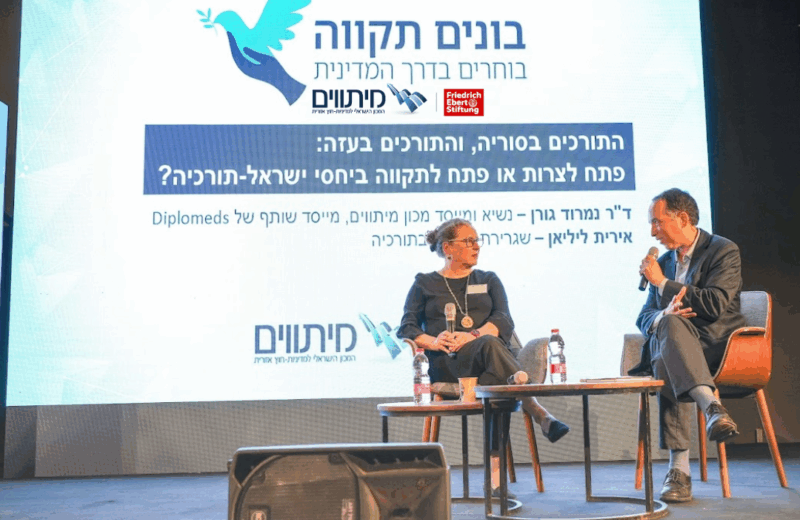 / All Events
/ All Events
Dr. Nimrod Goren, President of the Mitvim Institute, hosted an open and candid conversation with Irit Lillian, Israel’s Ambassador to Turkey – the most senior Israeli diplomat dealing with the Turkish arena in recent years, who is currently back in Israel due to the effective downgrading of relations following the war.
The talk took place as part of Mitvim’s 8th Annual Regional Foreign Policy Conference at the Yitzhak Rabin Center in Tel Aviv in November 2025, in partnership with Friedrich-Ebert-Stiftung Israel.
Goren reminded the audience that despite the public discourse in Israel that tends to frame Turkey as an enemy state, it is in fact a country with over 75 years of continuous diplomatic relations with Israel, marked by both crises and rapprochements.
Before we talk about the present,” he said, “we need to remember that Turkey is not a foreign or unknown country for Israel. This is a partnership with many layers – historical, security-related, and economic.”
At the same time, the war in Gaza and Ankara’s firm alignment with Hamas have significantly altered the landscape.
Lillian opened with a direct description of the Turkish perspective: “When people in Turkey talk about Gaza, it’s not just an interest; it’s the heart. In Erdoğan’s Turkey, Hamas is not seen as a terrorist organization, but as ‘the legitimate representative of the Palestinian people’s aspirations.’”
According to her, the Turkish attitude toward the Palestinian issue is deeply embedded in national and religious identity and is shared by both the governing coalition and the opposition. Beyond the emotional layer, there is also an element of international prestige: Erdoğan’s Turkey seeks to be seen as a central regional actor – a mediator and influential player – in the Russia–Ukraine conflict, in Africa, and now also in Gaza.
On the question of Turkey’s future role in Gaza, Lillian was clear: Israel openly states that it does not want to see Turkish soldiers as part of any multinational force in Gaza. But Turkey is already there – through charities, truck convoys, and humanitarian activity.
“The question is not whether there will be Turkish involvement,” she said, “but how extensive it will be.”
She emphasized that some of the organizations working in Gaza – such as IHH – are viewed very negatively in Israel, but in Turkey are perceived as entirely legitimate aid organizations.
Syria: Interest, Not Emotion
When it comes to the Syrian arena, Lillian painted a very different picture: “If in Gaza there is an emotional element, in Syria it’s all about calculation. Syria is the ‘big sweep’ for the Turks. That’s where they wanted to be the shaping power, but reality turned out to be far more complicated.”
Turkey had once hoped to wield decisive influence in Syria, she noted, but is now in a phase of disappointment and recalibration.
“Today,” she said, “Turkey will not be able to rebuild Syria on its own. The coffers are empty, and the ambitions are larger than the capabilities.”
Regarding the risk of friction between Israel and Turkey in Syria, she added: “Neither country wants a confrontation. There are technical coordination channels, and there is a shared interest in preventing escalation.”
At the same time, she warned about the evolution of mutual threat perceptions: Israel increasingly sees Turkey as a threat, and in Turkey’s National Security Council, Israel is officially defined as Threat Number One.
Is there any realistic prospect for renewed closeness in the near future? Lillian did not sugarcoat: “We are in one of the most serious crises the relationship between the two countries has ever known. The glass ceiling is very low and very thick. It will be tough to break through it in the near term.”
Still, she stressed that dialogue must continue: “The relationship with Turkey is a system of ups and downs. You have to know how to live with that. Even in the darkest periods, there is room for dialogue, if not at the political level then at the professional or civil level.”
In her view, economics, energy, and regional stability are natural future anchors for cooperation: “Relations with Turkey are always complex. But even in the hardest times, you must not slam the door shut. Dialogue, even minimal, is a precondition for the day when it will be possible to rebuild trust.”
Turkish Democracy – A Warning Sign for Israel
On the state of democracy in Turkey, Lillian offered one of the panel’s most striking observations: “Democracy is not just about elections. Once you give up on core values, you don’t slide down a slippery slope. You simply take a step into the abyss.”
She described how an entire system of values – press freedom, judicial independence, human rights – has been gradually eroded under Erdoğan. Even if elections are held, she argued, “that does not in itself make the system truly democratic.”
Yet she also pointed to elements of hope: “In Turkey, there is still a brave civil society that fights for its democracy – sometimes from the streets, sometimes from inside prison walls.”
Photo & video: Constantin Grossman


